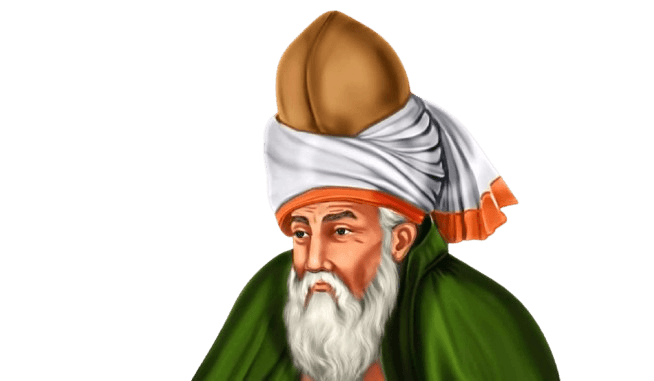Life and achievements
Early life
Rumi was born on September 30, 1207, in Balkh, present-day Afghanistan, or Wakhsh, present-day Tajikistan. His father, Baha al-Din Walad, was also a scholar of religion, jurist, and mystic. The first period of Rumi's life is associated with his family's migration due to the Mongol invasions in the West's direction, with the family's final settling in Konya, Turkey. This migration exposed Rumi to a cultural and spiritual environment that played a significant role in his life.
Rumi encountered many traditions in Anatolia. His first teacher was his father, who gave him a good grounding in Islamic law and mysticism. His early life was also enriched by the works of Persian poets Attar and Sanai, who inspired him in his spiritual and poetic journey. These great scholars, who were mentioned earlier in this paper, affected Rumi in his early life and led him to spiritual change.
The second significant event in Rumi's life is associated with the meeting of the dervish Shams-e Tabrizi in 1244. This meeting was a turning point in Rumi's life, and he chose to take a more rigorous path in the Sufi way. Shams is said to have introduced Rumi to a new form of learning, and the two have become very close friends and spiritual confidants. Rumi changed from a rational scholar to a dancing and singing lover. This period can be considered the most fruitful period of Rumi and his becoming the master of Sufism.
Shams left Rumi, and Rumi had to face some of the most challenging times of his life, including the phase of searching depicted in his poetry. The works he created during this period are characterized by spiritual themes and the author's longing for unity with the divine. This period of Rumi's life also witnessed the emergence of the Mevlevi Order, which became the official institution that propagated Rumi's teachings and the practices of his disciples. The whirling dervishes, one of the symbols of this order, represented the seeker's path towards the love of the divine and the unity with it.
Legacy
Rumi left behind a great legacy. He was a poet, a scholar, and a spiritual leader. His principal works, the Masnavi and Divan-e Shams-e Tabrizi, are among the best pieces of Persian literature. This work is also called the 'Quran in Persian'; it is a treasure trove of spiritual discourses and practical guidelines in the form of stories and verses. This work has affected many people and is still considered one of the most popular spiritual handbooks.
The followers of Rumi, who belonged to the Mevlevi Order, propagated his teachings and became famous for the Sama or the Dance. This Dance, which symbolizes the soul's journey in the search for the divine, is linked to Rumi in the present era. This order has continued to expand the dissemination of Rumi's message for centuries; it is relevant and vital today. The annual festivals celebrated in Konya, Turkey, are famous and illustrate the influence of Rumi even in the present world.
Rumi's poetry is straightforward, and anyone who reads it can easily comprehend it. His works have been translated into many languages, and for this reason, he is among the most-selling poets in the world. Rumi's verse is famous in America and translated by people like Coleman Barks, who makes it easier for everyone to comprehend Rumi. Thus, the teachings of Rumi on love, acceptance, and the Sufi path to the divine are still relevant to people of different nations and confessions.
Some significant themes in Rumi's poetry include love, separation, and the search for the divine, which are issues that interest anyone in the world. He has been able to pass across vital messages on spirituality in straightforward language and, at times, in the form of poems, thus making him one of the most respected spiritual leaders of all time. Rumi is not only a poet, but his work is also used in other fields, such as psychology, philosophy, and arts. His teachings on love and the human soul help us to understand the world and the process of the soul's evolution.
Milestone moments
Sep 18, 1207
Birth of Rumi
Jalaluddin Rumi was born on September 30, 1207, in Balkh, now in Afghanistan, or Wakhsh, now in Tajikistan. This birth marked the beginning of one of the most outstanding spiritual leaders in the world.
This period in Rumi's life can be regarded as the early period of his spiritual growth, influenced by his father, Baha Al-Din Walad, a great scholar and Sufi.
The first period of Rumi's life was the period of his father's education, which was the foundation of Rumi's spiritual and literary education.
Feb 7, 1212
Migration to Anatolia
Rumi's family had to escape the Mongol invasion and shifted to the West, Konya, Turkey.
This migration exposed Rumi to other cultures and other forms of beliefs, which shaped his spiritual growth and future teachings.
The move to Anatolia was essential to the development of Rumi as a person and a writer because he was introduced to various spiritual and cultural influences.
Oct 9, 1244
Meeting with Shams-e Tabrizi
Rumi, the Sufi Mystic, was destined to encounter a dervish named Shams-e Tabrizi on November 15, 1244, and this encounter transformed his life.
Shams's instructions and the Sufi master's companionship shifted Rumi's focus from the logical and educational approach to existence and the divine.
This meeting became the starting point of Rumi's most fruitful period of creativity, during which he searched for the perfection of the spirit, which influenced the further evolution of his creation.
Jun 5, 1248
Disappearance of Shams
Shams-e Tabrizi disappeared on December 5, 1248, affecting Rumi significantly.
Rumi's pain and search for Shams are clearly illustrated in his poems, especially in the Divan-e Shams-e Tabrizi.
Thus, this time of loss and longing played a significant role in Rumi's spiritual evolution and turned him into one of the most beloved poets of love.
